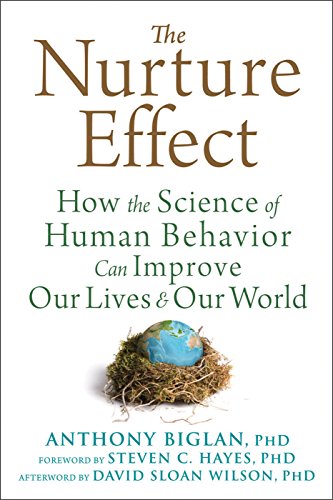The Nurture Effect: How the Science of Human Behavior Can Improve Our Lives and Our World

“Kudos to Dr. Biglan for daring to write this book, and let’s hope for all of our sakes that policy makers adopt some of the principles.”
It’s a brave new world when a man titles a book with nurture in it. I can just hear the testosterone set griping about the feminization of society; however, Biglan does craft an easy-to-read book about an integrated perspective on raising healthy children and what we need to change in our policies to achieve this goal.
He asserts that it is in our collective best interests to reduce conflict and increase cooperation in our society. This is not a new premise, but he does elicit several principles which could be adopted by nonprofit organizations, educational organizations, and policy makers.
Of course, when it comes to American family life lots of folks are uncomfortable with policy makers attempting to influence private domain. But just as we have laws for crime prevention, pollution prevention, and other public interests, Biglan promotes some compelling arguments to further our community sphere in family life.
Community, meaning our collective well-being and how we can promote behavior that benefits society, is the hallmark of Biglan’s treatise. Prosociality or cooperating with others and sacrificing to foster community development is one of his points. Cooperation of course reduces conflict and aggressive behaviors which can result in crime and other problems. Yet he elucidates that depression is actually a brain management tool in times of conflict and can serve a stress-controlling purpose. In our self-aggrandizing culture who would have thought depression would be perceived as purposeful?
One of the dangers of analyzing nurturing is the intense focus on the first two years and the preschool years in a child’s life, which is typically dominated by the mother, and hence the Freudian stink of blaming Mommy for all ills is in the room. But if you read further, you will learn that Biglan is taking a total environmental view, which incorporates diet, education, health care resources, and natural conditions.
The book does have its moments of levity as when Biglan says, “As a guy I was distressed to discover newborns had no preference for Dad’s voice.” Also enjoyable is the scrutiny he provides for excess rewards to elicit child behaviors, which can cause perverse consequences. (Soccer trophies for all ring a bell?) Biglan’s book does tend to be an insider’s read for academics, with lots of name dropping and obscure references only known to this crowd.
One wonders how the use of the word nurturing will fare in policy advancing issues, as this is still viewed as a primarily female dominion and hence of lower value in our society than such male-dominated activities as running corporations—nothing new in that many of the things we need to do in order to raise well-adjusted well educated children is exemplified through awareness, patience, and hard work.
However, his ideas of not labeling kids in school and letting them develop outside of stereotypical expectations has merit. Some school districts do allow open enrollment for honors and advanced course work.
He also explains acceptance and commitment therapy which has been successful in treating schizophrenics. The citations of scientific studies for human behavior is also helpful in moving us along the logical path to conclusions which can help us live and work better together.
Biglan is optimistic and believes that in the future we will be able to avail ourselves of smartphone apps and online programs to improve our behavior psychology. He does establish a bulkhead for the need to create a society-wide goal of increasing the ability of families to nurture children, à la Scandinavian cultures, which means more flexible parental leave, better health care supports, and integrated school systems.
Kudos to Dr. Biglan for daring to write this book, and let’s hope for all of our sakes that policy makers adopt some of the principles.